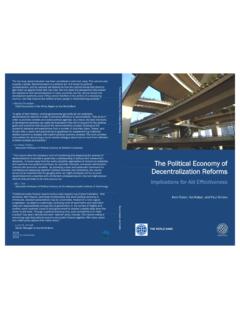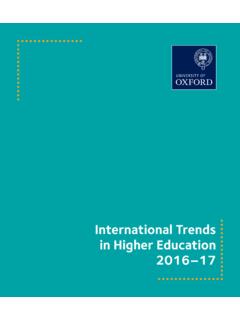Transcription of Conceptual Framework for Studying the Effects of ICT in ...
1 International Expert Meeting on ICT in education Indicators, Busan, South-Korea, 7-9 July 2009 1. Conceptual Framework for Studying the Effects of ICT in education Friedrich Scheuermann European Commission, Joint Research Centre Centre for Research on Lifelong Learning (CRELL). Ispra, Italy International Expert Meeting on ICT in education Indicators, Busan, South-Korea, 7-9 July 2009 2. CRELL at the Joint Research Centre CRELL is hosted by the Unit of Applied Statistics and Econometrics, JRC Ispra. As a Directorate General of the European Commission, the JRC provides scientific and technical support to Community policy-making. 7 Institutes in 5 Member States (total staff: 2,700). CRELL was established 2005 by Directorate General education and Culture and the Joint Research Centre of the European Commission CRELL combines research in education , social sciences, economy, econometrics and statistics in an interdisciplinary approach 12 staff members International Expert Meeting on ICT in education Indicators, Busan, South-Korea, 7-9 July 2009 3.
2 Emergence of European policy on Lifelong Learning Lisbon European Council March 2000. Open method of coordination : Guidelines for the Member States Indicators and benchmarks Exchange of good practice Peer reviews and mutual learning processes Common objectives of education and training systems European Quality Framework Efficiency and Equity International Expert Meeting on ICT in education Indicators, Busan, South-Korea, 7-9 July 2009 4. Detailed Work programme of 2002. 3 strategic objectives 13 detailed objectives 5 benchmarks (Reference Levels of Average Performance In EU Member States). 29 indicators for monitoring progress Standing Group on Indicators and Benchmarks (27 EU countries, 2 EEA countries, Commission, OECD, Cedefop, Eurydice, CRELL).
3 Progress Reports International Expert Meeting on ICT in education Indicators, Busan, South-Korea, 7-9 July 2009 5. Communication on a Coherent Framework of Indicators and Benchmarks (Feb. 2007). Policy Areas 1. Improving equity in education and training;. 2. Promoting efficiency in education and training;. 3. Making lifelong learning a reality;. 4. Key competencies among young people;. 5. Modernising school education , 6. Modernising VET (the Copenhagen process);. 7. Modernising higher education (the Bologna process);. 8. Employability. KERIS, Seoul,Expert International KoreaMeeting on 19 June 2008. on ICT in education Indicators, Busan, South-Korea, 7-9 July 2009 6. 1. Objectives: Strategic and detailed objectives 1. Improving the quality and effectiveness of education an training systems in the EU.
4 1. Improving education and training for teachers and trainers 2. Developing skills for the knowledge society 3. Ensuring access to ICT for everyone 4. Increasing recruitment to scientific and technical studies 5. Making best use of resources 2. Facilitating the access of all to education and training systems 6. Open learning environment 7. Making learning more attractive 8. Supporting active citizenship, equal opportunities and social cohesion 3. Opening up education and training systems to the wider world 9. Strengthening the links with working life and research and society at large 10. Developing the spirit of enterprise 11. Improving foreign language learning 12. Increasing mobility and exchange 13. Strengthening the European co-operation International Expert Meeting on ICT in education Indicators, Busan, South-Korea, 7-9 July 2009 7.
5 2. Benchmarks: 5 EU European Reference Levels of Average Performance to be reached by 2010. 1. Reduce the share of 15 years old low achievers in reading (PISA, level 1) by 20% compared to 2000. 2. No more than 10% of young people (aged 18-24) should be early school leavers*. 3. At least 85% of young people (aged 22) should have completed at least upper secondary education 4. Increase the number of MST graduates by 15%. 5. At least 12,5% of adults (aged 25-64) should participate in lifelong learning. *Early school leavers: percentage of the population aged 18-24 with at most lower secondary education and not in further education or training. International Expert Meeting on ICT in education Indicators, Busan, South-Korea, 7-9 July 2009 8.
6 Progress in the 5 benchmarks Based on data 2000-2007. Benchmark already achieved: Mathematics, science and technology graduates Constant, but not sufficient progress: Early school leavers Upper secondary attainment Lifelong learning participation No progress yet: Low achievers in PISA. International Expert Meeting on ICT in education Indicators, Busan, South-Korea, 7-9 July 2009 9. 3. Indicators: Coherent Framework of indicators and benchmarks 16 core indicators 1) Participation in pre-school education 9) Upper secondary completion rates of young 2) Special needs education people 3) Early school leavers 10) Professional development of teachers and 4) Literacy in reading, mathematics and trainers science 11) Higher education graduates 5) Language skills 12) Cross-national mobility of students in higher 6) ICT skills education 7) Civic skills 13) Participation of adults in lifelong learning 8) Learning to learn skills 14) Adults' skills 15) Educational attainment of the population 16) Investment in education and training (+ Creativity and Innovation).
7 International Expert Meeting on ICT in education Indicators, Busan, South-Korea, 7-9 July 2009 10. Data sources LFS Participation ESS. UOE Mobility, financing CVTS Vocational education and training AES Self reported adult skills SICTU ICT. PISA survey Maths, reading, science skills PISA-Vet Vocational education and training TALIS survey Teacher education (CRELL). PIAAC survey Adult skills AHELO Learning outcomes in Higher education ICCS survey Civic skills (CRELL). ICILS Computer and information literacy Language survey Language skills (CRELL). L2L survey Learning to learn skills (CRELL). International Expert Meeting on ICT in education Indicators, Busan, South-Korea, 7-9 July 2009 11. Indicator development Quantitative Composite indicators analysis and quantitative analysis Indicators Indicators Indicator identification COM SGIB.
8 Data producers Stat. & Ind. Stat. & Ind. Stat. & Ind. International Expert Meeting on ICT in education Indicators, Busan, South-Korea, 7-9 July 2009 12. Role of ICT. STAFF WORKING PAPER: The use of ICT for innovation and lifelong learning for all. A report on progress (November 2008). ICT CLUSTER of 18 Member States 2009 - The European Year on Creativity and Innovation Innovative learning through the use of ICT. Ongoing STUDIES related to : Learning New learning communities through ICT. European-wide comparison of the impact of ICT on school education Development of methodologies for ICT indicators Study of the impact of TEchnology in Primary Schools (STEPS). International Expert Meeting on ICT in education Indicators, Busan, South-Korea, 7-9 July 2009 13.
9 Need for regular studies on ICT impact New technologies ( ePortfolios). Changing contextual conditions New teaching practices New ways of learning Increasing policy interest in understanding phenomena, Effects and interrelations NEED TO BE FREQUENTLY UPDATED ABOUT TRENDS AND ICT Impact International Expert Meeting on ICT in education Indicators, Busan, South-Korea, 7-9 July 2009 14. Situation Most studies do not provide a clear information about the real Effects of ICT on learner and learning for policy-making Lack of comprehensive studies of the complex interactions between various types of ICT implementation and the Effects of other factors such as institution-based interventions, socio- economic status and institutional expenditures No large-scale longitudinal studies of ICT's impact in education Need for a thorough, rigorous, and multifaceted approach to analysing the impact of ICT on education and students' learning.
10 (Cox & Marshall, 2007, also Kikis & Kolias 2005; Aviram & Talmi 2004 etc.). International Expert Meeting on ICT in education Indicators, Busan, South-Korea, 7-9 July 2009 15. JRC Research : Influence of ICT on educational performance Research questions What are the ICT-related factors that (positively or negatively). stimulate performance and outputs of education ? What is the impact of digital media on personal development and learning? How can ICT contribute to flexible learning arrangements? What are the indicators for observing educational Effects of ICT and how can it be measured at a comparative level across individuals, institutions and countries? International Expert Meeting on ICT in education Indicators, Busan, South-Korea, 7-9 July 2009 16.
















